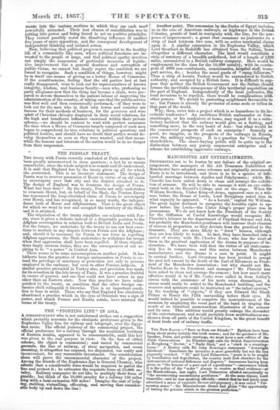• THE PERSIAN TREATY.
THE treaty with Persia recently concluded at Paris seems to have been greatly misconceived in some quarters ; a fact by no means remarkable, since the whole subject is so remote and ill-understood. It is said that England. has by the treaty given up all for which she contended.. This is an incorrect statement. The design of Persia was to recover possession of Herat in virtue of an old claim to sovereignty over that city and the district attached to it. The design of England was to frustrate the design of Persia. What has been done ? By the treaty, Persia not only undertakes to evacuate Herat, but, on behalf of the Shah, the Persian Envoy has renounced the long-cherished claim of Persia to sovereignty over Herat, and has recognized, in so many words, the independence both of Herat and Afghanistan. That is the great object for which we went to war and occupied the territory of the Shah: and it is attained.
The stipulation of the treaty simplifies our relations with Persia, since it gives a definite instead of a disputable _position to the Afghan sovereignties in relation both to British India and Persia. For the future, we undertake by the treaty to use our best exertions to mediate in any dispute between Persia and the Afghans; and, should it bo necessary for Persia to use force in repelling Allghan aggressions, the Shah undertakes to withdraw his troops when that aggression shall have been repelled. If these stipulations imply onerous duties, they are the consequences of our aspiring to be "a power" in Central Asia. There seems to be some misconception on another point. It has hitherto been the practice of foreign ambassadors in Persia to extend the privilege of sanctuary or protection not only to persons employed in the embassy, but even to other Persian subjects. A similar practice prevailed. in Turkey also, and provision was made for its cessation in the late treaty of Paris. It was a practice fruitful in causes of quarrel, and one that could not have arisen in any other than an Eastern state. Now this practice we have relinquished by the treaty, on condition that the other foreign embassies shall relinquish it likewise. This is an important condition to bear in mind. Those who say that England has absolutely abandoned a practice which in the eyes of Orientals was a sign of power, and which France and Russia retain, have misread the terms of the treaty.


























 Previous page
Previous page